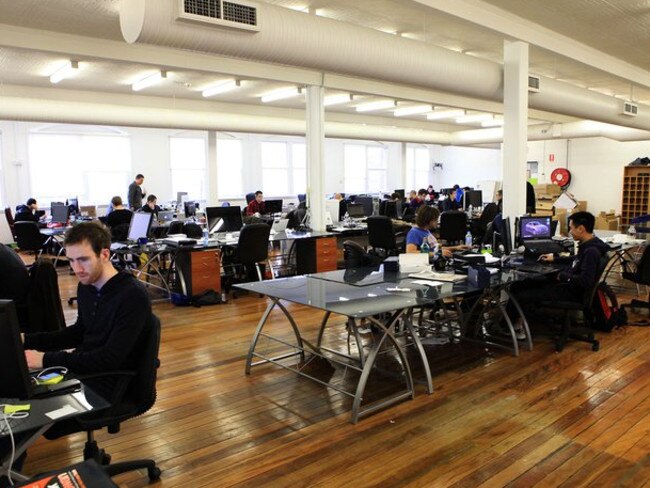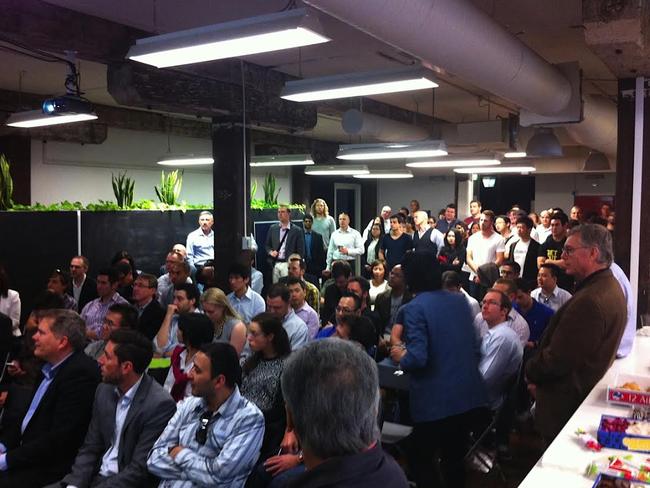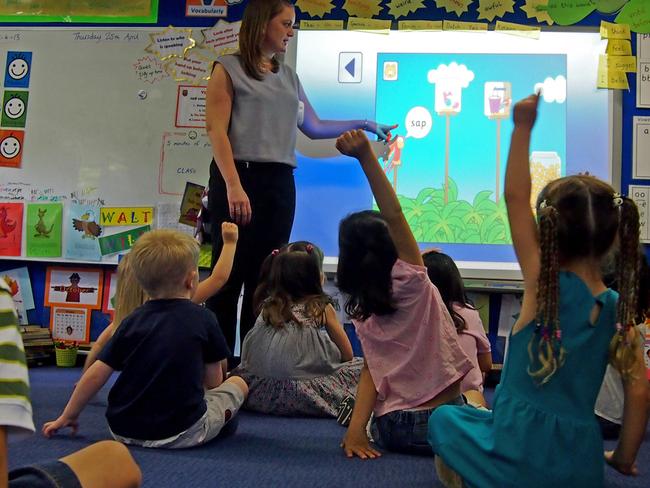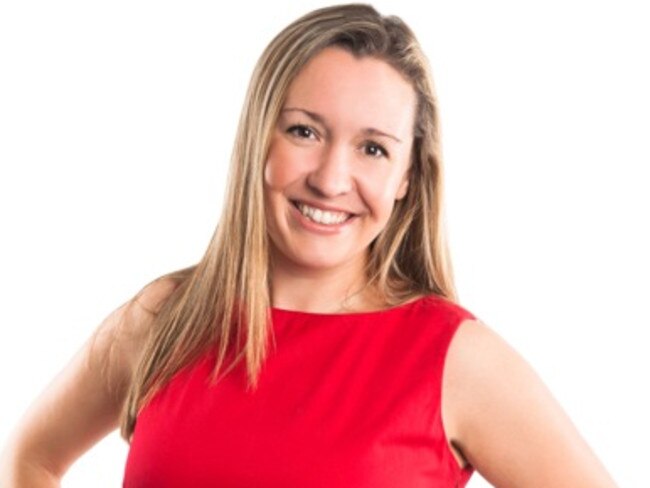Inside entrepreneur community Fishburners, where Aussie start-ups work on becoming the next big thing
IN A rundown warehouse near Sydney’s Chinatown is a hive of workers feverishly vying to be the next big thing. And they’re attracting some major attention.

Small Business
Don't miss out on the headlines from Small Business. Followed categories will be added to My News.
IN A shabby warehouse in Sydney’s Chinatown is a group of people feverishly vying to be the next big thing.
Too big for their bedroom but too small for an office, they’ve set up shop at Fishburners, a non-profit organisation that feels something like Google may have 15 years ago — on a hangover and on a budget. There are the wooden floors, cowhide rugs and fixie bikes hanging from the wall, but without the sheen billions of dollars can give.
The space was founded by Pete Davidson, an early PayPal investor and entrepreneur, who partnered with Mike Casey to design a Silicon Valley-style shared working space for fledgling start-ups.

It takes its name from First Fleet ship Fishburn, which brought supplies to sustain the early colony in Australia. Members can rent a permanent desk for $400 a month or $300 for a spot on a communal bench. It also receives corporate sponsorship from Optus, PricewaterhouseCoopers, News Corp Australia (the owner of this publication), Big Air and Anchor.
Community manager Pandora Shelley, 23, who has been there three years and clearly loves the vibe said membership means access to workshops on sales, marketing, public relations, the all-important “pitching,” and pro-bono sessions from lawyers and accountants. There’s also a heap of social activities from “pitches and beers” nights to the “fishbowl” to workshop problems and subsidised lunches each week.
But while it might not be awash with cash, what it does have is ideas. On a Thursday afternoon the place is humming with industrious intellects in hoodies, tapping at laptops, skyping colleagues and holding boardroom meetings. It’s the place that spawned Australia’s version of Airbnb, 99 dresses and taxi app GoCatch with the buzz of being on the cusp of something big. So are they all plotting world domination?

Not at all, said general manager Murray Hurps, 30, who has his own start up AdMuncher. He said the community has a unique vibe of collaboration and creativity that isn’t found in many other places.
“When people come in you can tell if they’re new because they don’t want to tell you about their idea.”
“As people go on they’re much more open about their numbers and how they’re finding successes because it comes back to them through other people doing the same thing. It’s competitive in that everyone is aiming to get to the same thing — to realise their idea as quickly as possible but not to the detriment of anyone else.”
Rather than sell out for billions like Tumblr’s David Karp or Whatsapp’s founders, Mr Hurps said most members are focused on satisfying their entrepreneurial curiosity.
“You say ‘I’d like to build a company around that.’ ‘I can scale it and I can solve it and have millions of customers that can enjoy the benefits.’ That seems to be the common thing that they’re all just trying to solve the problem” he said.
“For myself personally it’s doing something that has impact to the Australian economy. To create a large number of jobs, to create a large amount of export, to bring investment to Australia and help Australia do something other than what it’s traditionally done.”

Among the 120 members is Katherine Wood, the managing director of online reading and spelling program Phonics Hero who has captured the attention of Google execs. She’s being sent on an all-expenses-paid trip to a mansion in Silicon Valley known as the Black Box where entrepreneurs from 20 different countries sleep in bunks and sweat their idea for two weeks solid in the hope of making it a household name.
While education isn’t the sexiest idea on the start up scene, with 15,000 users already she’s got the all-important traction investors need to stump up cold-hard cash for an idea.
“[Investors] love it when you’ve got traction. Traction can be you’ve got this many eyeballs or you’re making this much money. You’ve got a relationship with this company or a partnership deal. Because you’ve proved outside of your wonderful idea that there’s something there,” Ms Wood said.

The space is about undergo a Google-sponsored renovation to double the size. But not just anyone can get a spot. Ms Shelley said there are three main criteria to fill and those that aren’t meeting their end of the bargain will be asked to move on.
“We’re basically look at A) ‘Are they a Fishburner?’ and by that I mean are they going to contribute as in not sit at their desk and not talk to anyone all day. Do they come across friendly do they seem excited by the place?”
“Second to that is their start-up. What are they working on? Is it something innovative and is it going to be a big success? We’re not really looking for people who are going to just come in and do contract work.”
“The third point is the person. If they’re someone with amazing skills and they’re happy to share those skills with everyone then number two doesn’t matter as much.”

David Soutar is another of the lucky members. The former engineer and head of Fosters in Europe has a company, Wattcost which helps people save money and energy on their power bill. He got the idea after living in Europe where energy efficient housing is the norm.
“I kept wondering why nobody had done this for homeowners? With the price of electricity going up it’s one of those things that we don’t know what’s going on until we get the bill and it’s pretty bad ... I was sitting outside this apartment block looking at 20 power metres saying ‘why can’t these tell me what’s going on while it’s happening?”
The result is a sleek looking sensor that uses Wi-Fi to tell homeowners everything from where to save money to whether you left your hair straightener plugged in. It’s already won plenty of awards and they’re taking pre-orders for a pending release.

But be warned, entrepreneurship is not for the faint hearted. Ms Shelley said the “happy downside” is that Fishburners will lose companies when they get bigger. But the failure of other companies like 99dresses show how much hard work it can be.
MORE: 99dresses founder Nikki Durkin on what it’s like when start-ups fail
“The reality is it doesn’t happen quickly. [We came up] with the idea over three years ago ... nothing happens overnight. It’s quite a long expensive process,” Mr Soutar said.
And with that, there’s a knock on the boardroom window and the next team is hustling to use the space. It’s back to business for the tech industry’s next generation of world beaters.
Originally published as Inside entrepreneur community Fishburners, where Aussie start-ups work on becoming the next big thing


